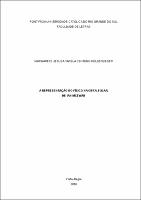| Compartilhe o registro |


|
Use este identificador para citar ou linkar para este item:
https://tede2.pucrs.br/tede2/handle/tede/6551| Tipo do documento: | Dissertação |
| Título: | A representação do físico na obra Solar, de Ian Mcewan |
| Autor: | Hülsendeger, Margarete Jesusa Varela Centeno  |
| Primeiro orientador: | Kohlrausch, Regina |
| Resumo: | Ciência e literatura, apesar das linguagens diferentes, têm mais pontos em comum do que se possa imaginar. Um desses pontos é a presença de personagens oriundos da ciência em obras literárias. Assim, esta pesquisa teve como objetivo central responder: como personagens originários das ciências naturais, em especial da física, são representados na literatura? Para responder a essa pergunta, este trabalho utilizou como corpus o livro Solar, do escritor inglês Ian McEwan, e como método de análise a Análise de Conteúdo. A fundamentação teórica centrou-se no estudo do conceito de foco narrativo, na identificação dos diferentes tipos de narradores e na apresentação de uma teoria do personagem, tendo como base, principalmente, as ideias de Mikhail Bakhtin e Antonio Candido. Na análise do perfil biográfico do autor e dos componentes externos (dedicatória e epígrafe) da obra, constatou-se a presença de uma intencionalidade cujo objetivo é provocar uma reflexão sobre o problema do aquecimento global. O estudo sobre o foco narrativo de Solar verificou a existência de um “autor implícito” (BOOTH), o predomínio da cena e uma narração no estilo indireto livre, dando à narrativa mais riqueza e fluidez. O físico representado em Solar reúne um conjunto de traços que valoriza o fato de o protagonista ser um cientista famoso, ganhador do Nobel de Física, sem deixar de apontar os aspectos negativos de sua personalidade, inspirando-se, muitas vezes, em figuras conhecidas da ciência, como Albert Einstein e Paul Dirac. Também foram analisados os diferentes estereótipos utilizados na composição do personagem, entre os quais o fato de o cientista ser um indivíduo insensível, incapaz de relações afetivas, preocupado apenas com o seu trabalho, desprezando profissionais de outras áreas do conhecimento. Ao final, demonstrou-se que as concepções sobre o pensamento científico do protagonista descrevem-no como um físico com uma mentalidade positivista – acredita em uma ciência descolada da presença humana, determinista e casuística – conservador, preconceituoso, com dificuldades de compreender e aceitar novas ideias. |
| Abstract: | Between science and literature, despite their language differences, there are more points in common than one would imagine. One of these points is the presence of characters from science in literary works. Thus, one of the main objectives of this research is to investigate how characters originally from the natural sciences, especially physicists, are represented in literature. In order to answer this question, this dissertation uses as its object of study the novel Solar, by the British writer Ian McEwan, and as a method, the Analysis of Content.The theoretical foundation is focused on the study of the concept of narrative focus, on the identification of different types of narrators, and on the presentation of a theory of character, based on the ideas of Mikhail Bakhtin and Antonio Candido. An analysis of the biographical profile of the writer and of the external components of the novel (dedication and epigraph) reveals an intended goal of provoking reflection on the problem of global warming.A study of the narrative focus of Solar reveals that there is an "implied author” – in terms of Wayne Booth –, a predominance of the scene and a narration in free indirect discourse, giving the narrative richness and fluidity. The physicist presented in Solar brings together a set of features that valorize the fact that the protagonist is a famous scientist and Nobel Laureate, while also pointing out the negative aspects of his personality, as often inspired by known figures of science, such as Albert Einstein and Paul Dirac.The different stereotypes used in the composition of the character have also been analyzed, including the idea that a scientist can be an insensitive individual, incapable of emotional relationships, concerned only with his own work, and neglecting professionals from other areas of knowledge.In the end, it has been demonstrated that the concepts of scientific thought of the protagonist describe him as a physicist with a positivist mentality – he believes in a science that do not consider the human presence, deterministic and casuistic. He is conservative, biased, and struggles to understand and accept new ideas. |
| Palavras-chave: | PERSONAGENS (LITERATURA) CIÊNCIA LITERATURA - HISTÓRIA E CRÍTICA |
| Área(s) do CNPq: | LINGUISTICA, LETRAS E ARTES::LETRAS |
| Idioma: | por |
| País: | Brasil |
| Instituição: | Pontifícia Universidade Católica do Rio Grande do Sul |
| Sigla da instituição: | PUCRS |
| Departamento: | Faculdade de Letras |
| Programa: | Programa de Pós-Graduação em Letras |
| Tipo de acesso: | Acesso Aberto |
| URI: | http://tede2.pucrs.br/tede2/handle/tede/6551 |
| Data de defesa: | 12-Jan-2016 |
| Aparece nas coleções: | Programa de Pós-Graduação em Letras |
Arquivos associados a este item:
| Arquivo | Descrição | Tamanho | Formato | |
|---|---|---|---|---|
| DIS_MARGARETE_JESUSA_VARELA_CENTENO_HÜLSENDEGER_PARCIAL.pdf | Texto Parcial | 1,01 MB | Adobe PDF |  Baixar/Abrir Pré-Visualizar |
Os itens no repositório estão protegidos por copyright, com todos os direitos reservados, salvo quando é indicado o contrário.




